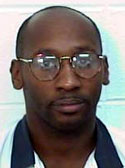Supreme Court rejects appeal of death row inmate Troy Davis
By Jesse Muhammad -Staff writer- | Last updated: Apr 17, 2011 - 8:22:54 PMWhat's your opinion on this article?

Troy Davis
|
Justices halted Atlanta's 11th Circuit Court of Appeals from examining the controversial case, in which Mr. Davis was convicted and sentenced to death for the 1989 killing of Savannah police officer Mark MacPhail.
His sister, Martina Correia, described the decision as “shocking” and “hurtful” in a case that has received international interest and the plight of a man who has gained global support.
“We're saddened and distraught by this but we can't afford to wallow in grief because then we will lose the strength to keep fighting on. Troy told me it is not over until God says it is over,” Ms. Correia told The Final Call in a phone interview on March 31.
“The government is always talking about human rights violations in other countries but don't want to acknowledge the human rights violations in our own country. It is sickening how my brother has been treated and we don't intend on stopping,” said Ms. Correia, who has battled stage 4 cancer for 10 years.
She had an opportunity to talk with her brother and planned to visit him in prison soon. “Of course Troy is hurt by the news but he's more concerned about his family and all of the supporters more than his own life. If he's given clemency then we can keep fighting. If they kill him, we will work to clear his name which is known all over the globe,” she said.
“We still have the parole board which has the option to hear this case. They could hear this case and have a clemency. And of course we know the people will mobilize,” said Edward O. DuBose, chair of the Georgia State Conference of the NAACP, during a recent interview on the Tom Joyner Morning Show.
Mr. Davis was convicted and sentenced to death in 1991.
Witnesses claimed Mr. Davis, who was then 19-years-old, and two others were harassing a homeless man in the parking lot of a Burger King restaurant when off-duty officer MacPhail arrived to help the man. Witnesses also testified at trial that Mr. Davis then shot the officer twice and fled the scene.
Since 2007, the state of Georgia has slated Mr. Davis for execution three times only to have the executions delayed within hours or days.
In August 2009, the Supreme Court ordered the federal court in Savannah to hear Mr. Davis' innocence claim in an evidentiary hearing. In June of 2010, U.S. District Court Judge William T. Moore Jr. heard two days of testimony and two months later he ruled that Mr. Davis' defense team failed to present satisfactory proof of innocence.
Mr. Davis' attorneys argued that Judge Moore was wrong in his refusal to hear from potential witnesses who could testify that another man confessed to taking the life of Mr. MacPhail. The attorneys fi led this latest appeal in January, only to see it rejected.
“The court's refusal is shameful. That hearing last June was nothing more than a puppet show and I could tell that judge was going to deny my brother justice no matter what was presented by his lawyers.
The prosecutor acted so nasty towards Troy and the witnesses and basically criminalized them for recanting their trial testimonies. Then the police officers amazingly got amnesia when it came to remembering their misconduct towards the witnesses. But it is far from over,” said Ms. Correia.
(To follow updates on this case visit: www.troyanthonydavis.org)
Related news:
Final appeal made in Troy Davis case (FCN, 06-15-2009)
Fight of lifetime for Troy Davis (FCN, 11-04-2008)
INSIDE STORIES AND REVIEWS
-
-
About Harriett ... and the Negro Hollywood Road Show
By Rabiah Muhammad, Guest Columnist » Full Story -
Skepticism greets Jay-Z, NFL talk of inspiring change
By Bryan 18X Crawford and Richard B. Muhammad The Final Call Newspaper @TheFinalCall » Full Story -
The painful problem of Black girls and suicide
By Charlene Muhammad -National Correspondent- » Full Story -
Exploitation of Innocence - Report: Perceptions, policies hurting Black girls
By Charlene Muhammad -National Correspondent- » Full Story -
Big Ballin: Big ideas fuel a father’s Big Baller Brand and brash business sense
By Bryan Crawford -Contributing Writer- » Full Story






 Click Here Stay Connected!
Click Here Stay Connected!








